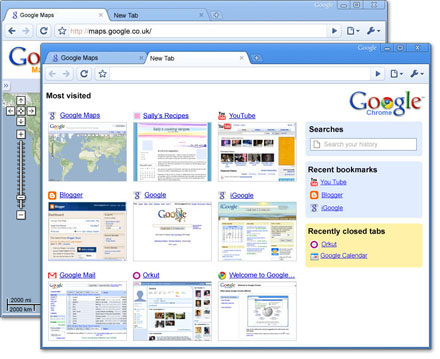
Google Chrome Source:Google.com
Google announced on its blog that it is going to launch its own operating system next year based around its web browser, the Google Chrome. The Google Chrome OS will initially be targeted at the netbook market. It will be open source and based on the Linux kernel. Since it’s a Google product, it’s going to be free as well. The blog claims that the new OS will be light weight and more focused on getting the user onto the internet within seconds of booting up rather than waiting minutes for the computer to load.
This step is perhaps the next best logical step for Google since the online world is its home ground. Right now, it depends on other providers providing the user with a platform-the OS and the browser-to get onto the internet and access its services. It solved part of the problem last year by launching its own web browser with the hope that it would come together with all its online applications to provide an integrated experience to the user.
So, an operating system that is oriented for the internet would be ideal for a netbook since such devices with low processing power are likely to be used for things like accessing the internet. However, totally depending on the internet to provide all the functionality assumes that the netbook would be constantly connected to the internet. The most popular method of accessing the internet through a netbook is by using a dongle that connects to the internet via the mobile 3G network. Although such dongles can be obtained cheaply through deals, which include the dongle and the netbook, such deals have incredibly small download allowances. Since there would be a lot of exchange of data with the internet, the download limit would be quickly reached. So, Google should not only work with manufacturers to get its OS onto their devices, but also with the telecommunications companies and explore new ways of providing cheap internet access with huge download caps where the cost is subsidised by advertising-Google’s main business.
Great offers at Skype’s clearance sale
The news media are referring to Google’s announcement as “Google taking on Microsoft”. I think that’s a bit premature to think that Google’s new OS,which depends on cloud computing, will offer all the functionality and applications that Microsoft’s operating system, which largely depends on software hosted locally, can provide the user. Especially since all we have from Google is an announcement, and not an actual product that can be tested, compared and bench marked.
That is not to say that Microsoft shouldn’t be worried about Google’s OS. That’s because currently, users that want Windows on their netbooks are offered Win XP and not Vista. The other alternative is a Linux based OS. Most users prefer XP although its expensive and old because they are familiar with the user interface and have apprehensions about switching to an unfamiliar system. That is why Linux distributions, most which are free and some of which already offer a light weight OS some as small as 50Mb, do not have many users since they are seen as being complicated and “techie”. But with a popular name like Google attached to it, it wouldn’t take long for these apprehensions to go away and for users to start switching to Chrome OS.
It would be interesting to see how Google goes on to monetize its operating system. Microsoft of course gets its revenue by charging a huge price to those who wish to use its operating system and so does Apple to those who wish to use its OSX, although its not so pricey. Linux distributions depend on a community of developers and some organisations get their revenue by providing support to businesses that use Linux operating systems and also by providing customised solutions. Google will obviously fall back on its core competency-its advertising business. That’s how it currently generates most of its revenue, by advertising to those that use its products.
Like in most cases, at the end of the day, it all depends on how Google execute their plan. If they become complacent and start thinking that anything that has the Google brand attached to it will become popular, their OS may not turn out to be a Windows killer. It will be interesting to see what the end product looks like when the beta version is released later this year.
And if any of its previous products are to go by, expect the Google Chrome OS to be in beta till the year 2020.
Bargain auctions ending soon, bidding starts at only 7p.
Register today for £10 off your first win!